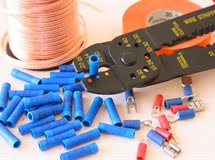THE Electronic Technology segment of the NSW Security Industry has just welcomed its first Government funded Trainee Mathios Kashro who is undertaking a 12 month traineeship titles CPP30507 Certificate III in Technical Security.
The Certificate III in Technical Security qualification has been developed in consultation with the Security Industry itself and once qualified Mathios will have the basic skills to develop a career in Electronic Security.
It has only taken thirteen years to achieve this milestone of a funded Security trainee for the Security Electronics sector. Why did it take so long? The answer is red tape. NSW Licensing regulation made bringing in a trainee into the Security Electronics industry almost impossible.
Since 1998 there has been a continual battle to remove the barriers that prevented employers utilizing the Technical Security Traineeship pathway to train and develop their technicians. ACFIPS, a NSW Training Advisory Body that has representation from a diverse range of industries has worked closely with a number of individuals from the security industry and government to see how a traineeship could be established within the Security Industry.
The ACFIPS Security Advisory Committee pursued the introduction of the Technical Security Traineeships. ACFIPS took responsibility to develop the Vocational Training Order which was gazetted in March 2010 proclaiming CPP30507 Certificate III in Technical Security as a 12 month traineeship with fully funded employer incentives of $4000 and funded training delivery for trainees.
Mibyte Technologies, employer of NSW’s first Technical Security trainee, selected MILCOM as the training organization to deliver the required off the job training at its facility in North Ryde and Australian Business Apprenticeships Centre to complete the required paperwork which was all done within one hour on the 22nd July 2011.
To successfully complete the traineeship, Mathios, will have to show that he gains the required knowledge and skill in a 14 units/subjects all of which are intrinsically linked to current technical security work practises and electronic technology.
Of the 14 subjects/units 10 are mandatory to the qualification but the remaining four can be chosen from a group of 9 which if required can align with the area the employer wants to specialise in.
The training that Mathios will undertake is a mixture of on the job plus attendance at the MILCOM Training College for classroom-based sessions at times that will be planned so as to minimise disruption to work activities. MILCOM has state of the art facilities and equipment and qualified and experienced trainers who know their stuff. First target for the trainee will be to obtain the ACMA OPEN CPR.
If the Security Electronics industry can train its own technicians this reduces the need to recruit and train up graduates from other related industries such as electricians. ACFIPS Security committee member Suzette Po Williams of Central Monitoring has a passion for the Security Electronics industry. She believes it is vital to train a skilled workforce from within the industry, and not rely on other industries to provide workers.
“It has taken a long time, but finally we have our first trainee that will receive industry specific training. I am keen to see more trainees, both males and females, entering what is an industry with plenty of potential and good job opportunities, said Williams.”










